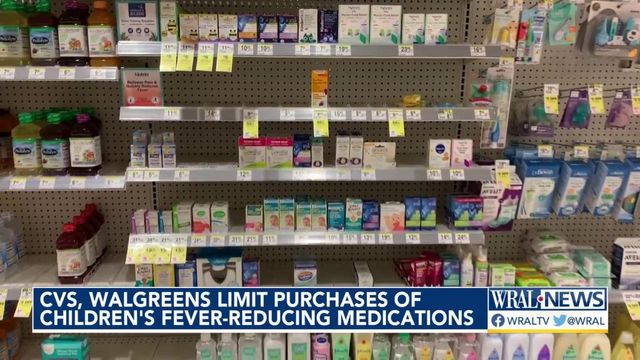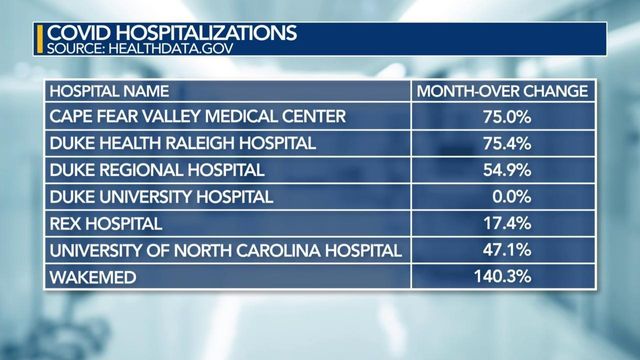Here's why it's hard to find children's pain and fever medicine in NC right now
Medical experts say it's just a matter of demand, and it'll ease when the current waves of COVID-19, influenza and RSV do.
Posted — UpdatedCVS, Walgreens and Target have limited purchases of children’s pain-relief medicine.
CVS is restricting both in-person and online purchases to two children's pain relief products. Walgreens has limited online purchases to six over-the-counter fever reducers per transaction, but it does not have an in-store purchase limit. Target said it is limiting online purchases.
The limitations come as the U.S. deals with a "tripledemic" of respiratory illnesses: COVID-19, influenza and respiratory syncytial virus (RSV). The tripledemic is putting the squeeze on supplies of medications like children’s Motrin and children’s Tylenol.
Medical experts say it’s just a matter of demand, and it’ll ease when the current waves of viruses do. In the meantime, makers of those products are running 24/7 trying to keep up.
Raleigh mom says it’s been hard to find ibuprofen for her daughter
Raleigh mother Olivia Brewer said she has had a hard time finding ibuprofen for her daughter Magnolia.
“We went to multiple locations to find some,” Brewer said. “It’s tough with a little one driving around town.”
“It’s the sickest season I’ve seen in a very long time,” said Dr. Hope Seidel with Cary Pediatric Center. “It’s hard."
Seidel said she isn’t surprised it’s hard to find children’s medications.
“We're actually seeing a surge of tons of different kinds of viruses right now,” Seidel said. “But the most common that you're seeing in the news is RSV, and flu and COVID.
“And all of those cause a fever in kids for the most part.”
Manufacturers deal with increased demand
"Supplies of these products are being replenished as quickly as possible, and there is not a widespread shortage in the U.S.,” CHPA wrote. “However, with demand for children’s pain and fever medicines reaching unprecedented levels following this early and severe flu season (along with cases of RSV and COVID), we understand why some retailers have adjusted to impose limits on purchases.”
CHPA Senior VP Anita Brakman told WRAL News the problem isn’t the supply chain. She said it’s just sky-high demand. However, she said, the trends appear to have peaked.
“Our major manufacturers of children's Tylenol, children's Motrin, children's Advil, the store brands have all of these types of products, they are manufacturing 24/7,” Brakman said. “And they're telling us they're getting the raw materials they need to do so, and they're doing everything they can to keep that increased capacity going until we get through this.”
In the meantime, Brakman is asking people not to rush out and stock up.
“That means another family, another child might not be able to get the medicine they need,” Brakman said. “So please, just buy what you need.”
Tips from Dr. Hope Seidel with Cary Pediatric Center for parents having a hard time finding fever-reducing medications:
"So oftentimes prioritizing the time that we give [medications], and then watching for how our child looks more than what their actual number is, can sometimes allow you to conserve the fever-reducing medicines a little bit better.”
"And the shortage notwithstanding, typically, it's ideal to try and get the temperature for your child down first, and then assess how they're doing.”
Related Topics
• Credits
Copyright 2024 by Capitol Broadcasting Company. All rights reserved. This material may not be published, broadcast, rewritten or redistributed.






